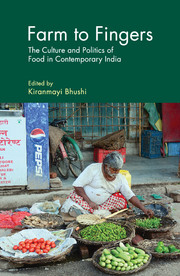Book contents
- Frontmatter
- Dedication
- Contents
- List of Figures and Tables
- Preface
- 1 Introduction
- 2 The Making of ‘Edible Animal Source Foods’ and its Contemporary Reality in Delhi
- 3 Appropriating the Cow: Beef and Identity Politics in Contemporary India
- 4 Eating Akhuni in India
- 5 Health, Standardization and ‘Bengali’ Sweets
- 6 Treating Children, Feeding Junk Food: An Inquiry into a Middle Class Project
- 7 Diaspora Dish: Cooking, Writing, and Creating Identities in Food-blogs
- 8 Measuring Hunger: Debates on an ‘Adequate’ Diet in Colonial North India
- 9 Managing Food: India's Experience with the Public Distribution System
- 10 Food Sovereignty: The Future of Food
- Contributors
- Index
8 - Measuring Hunger: Debates on an ‘Adequate’ Diet in Colonial North India
Published online by Cambridge University Press: 05 July 2018
- Frontmatter
- Dedication
- Contents
- List of Figures and Tables
- Preface
- 1 Introduction
- 2 The Making of ‘Edible Animal Source Foods’ and its Contemporary Reality in Delhi
- 3 Appropriating the Cow: Beef and Identity Politics in Contemporary India
- 4 Eating Akhuni in India
- 5 Health, Standardization and ‘Bengali’ Sweets
- 6 Treating Children, Feeding Junk Food: An Inquiry into a Middle Class Project
- 7 Diaspora Dish: Cooking, Writing, and Creating Identities in Food-blogs
- 8 Measuring Hunger: Debates on an ‘Adequate’ Diet in Colonial North India
- 9 Managing Food: India's Experience with the Public Distribution System
- 10 Food Sovereignty: The Future of Food
- Contributors
- Index
Summary
Introduction
The subject of diet and hunger is a comparatively uncharted terrain within the growing research on imperial medicine, tropical diseases, and the history of public health and sanitation in the Indian subcontinent. Most studies of diets remain embedded in the larger history of health, sanitation, disease, medicine, and poverty. It has been argued that during the nineteenth century, particularly in its closing decades, colonialism acquired a substantially more interventionist edge in the realm of medicine, control of tropical diseases, and the creation of a ‘sanitary utopia’. Some of the issues in the historical sociology of colonial medical and dietary knowledge have been pursued by David Arnold, in the Indian context (Arnold 1994, 2013). He suggests that before 1900 ‘apart from a passing interest in beri-beri and “famine foods”, there had been no systematic, scientific investigation of Indian diets, though in both British and Indian discourse the apparent deficiency of rice diets was repeatedly alluded to’ (Arnold 2000).Arnold's evidence is primarily derived from the post-1860s period although he suggests that ‘even in the early nineteenth century food and diet formed part of a colonial project of acquisition of knowledge about (and presumably power over) India and part of the colonial reconnaissance and categorization of India, its people and resources’ (Arnold 2000).
It has also been suggested that apart from a few exceptions, notably the investigations of Buchanan-Hamilton, early surveys neglected the issue of diet, and that questions about what people ate arose primarily in the context of prisons and to some extent famines. The army and prisons generated voluminous medical information that included observations on diets of Indians that were used to compare and understand what the general population ate and judgments were made on the nutritional value of Indian dietaries and its impact on the health of people (Arnold 1995; Alavi 1995; Bayly 1996). Large amount of such ‘knowledge’ was produced from the 1830s particularly during the colonial efforts to reform jails where a stricter discipline was sought to be imposed through the new penal code of Macaulay and the recommendations of the 1838 Committee on Prison Discipline. The centrepiece of this new ‘science’ of punishment was the creation of a new regimen of work, solitary confinement, overseas transportation of offenders and also a ‘disciplinary’ diet (see Yang 1987).
- Type
- Chapter
- Information
- Farm to FingersThe Culture and Politics of Food in Contemporary India, pp. 184 - 214Publisher: Cambridge University PressPrint publication year: 2017



